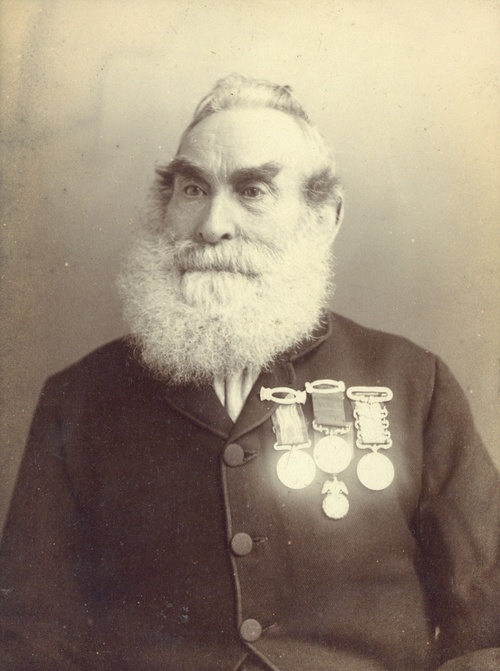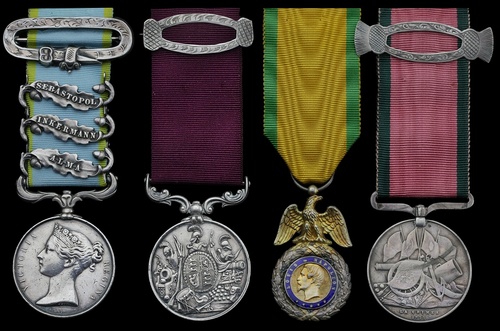Auction: 20001 - Orders, Decorations and Medals - conducted behind closed doors
Lot: 770
The impressive and extremely rare Medaille Militaire group of four awarded to Sergeant W. White, 7th (Royal) Fusiliers, decorated for his gallant conduct in the trenches before Sebastopol
Crimea 1854-56, 3 clasps, Alma, Inkermann, Sebastopol (Serjt. W. White. 7th Fuss.), naming officially engraved in large serif capitals by Hunt & Roskell; Army L.S. & G.C., V.R. (1512, Serjt. Wm. White, 7th R.F. 1859.60), small letter reverse, naming contemporarily engraved in serif capitals; France, Second Empire, Medaille Militaire; Turkish Crimea 1855 (Serjt. W. White, 7th R.F.), Sardinian die, manufactured by Hunt & Roskell, naming engraved in small serif capitals, replacement swivel straight bar suspension, the first, second and fourth fitted with attractive silver top riband buckles of various designs, the first with light contact marks, overall very fine (4)
One of nine Medaille Militaires awarded to the Royal Fusiliers.
William White was born in Leeds, Yorkshire. A paper maker by trade, he enlisted for service in the 7th (Royal) Fusiliers at his home town on 14 April 1840, aged 19. He was stationed at Gibraltar for four years, and North America for just over two years, before serving in the Crimean War.
At the Battle of the Alma on 20 September 1854, the Royal Fusiliers were engaged in a long and sanguinary musketry duel with the Kazan Fusiliers, their Russian 'nemesis' which was also the personal Regiment of the Grand Duke Michael. Fierce reputational pride was at stake; the two Regiments exchanged shattering volleys with just 40 yards separating their fronts. Despite their disorderly advance across the river, the Royal Fusiliers delivered such an accurate hail of Minié bullets into the dense Kazan column (still armed with smoothbore muskets) that the Russian advance stalled. One sharp-eyed Corporal of the Royal Fusiliers saw a Russian marksman take aim at his commanding officer, the gallant Colonel Yea. Just as the Russian was about to squeeze the trigger, the Corporal shot him dead. 'Thank you my man' exclaimed Colonel Yea, 'if I live through this you shall be a sergeant tonight!' Prince Gortschakoff rode forward and tried to inspire a desperate bayonet charge, but it was too late. The Royal Fusiliers routed their opponents and captured several brass drums. They had held the line magnificently, standing fast despite the repulse of the Light Division on their left, and the timidity of Canrobert's French columns to their right. Casualties were correspondingly high: an officer and 42 men killed, 11 officers and 168 men wounded.
White was promoted to Corporal on 23 December 1854, after the Battle of Inkermann, before rising to Sergeant in the trenches before Sebastopol in 1855. While at Sebastopol he earned a Good Conduct Badge. His record of gallant service was further recognised by the award the Medaille Militaire, one of just nine to his Regiment. The citation read as follows:
'Sergeant William White was present at the battles of the Alma and Inkermann, and in the trenches. Left the Crimea in May, 1855.'
White therefore missed the First Assault on the Redan on 18 June, in which Colonel Yea was killed. He was discharged on 9 April 1861. White's discharge papers confirm his full medallic entitlement, which is also illustrated in his superb portrait photograph, taken just after his return from the Crimea (illustrated). The papers reveal that he served an additional 19 years as Sergeant on the permanent staff of the South Lincolnshire Militia following his discharge in 1861.
Sold with copied discharge papers and the original sepia photograph of White in old age, proudly wearing his medals. In this image, the ornate riband buckles can be clearly seen.
Subject to 20% VAT on Buyer’s Premium. For more information please view Terms and Conditions for Buyers.
Sold for
£1,800
Starting price
£1650







